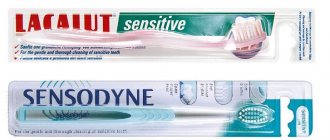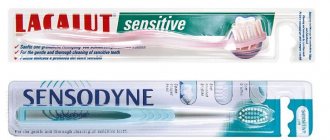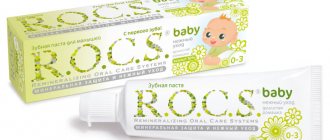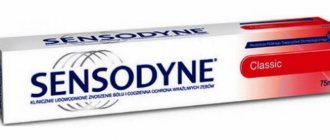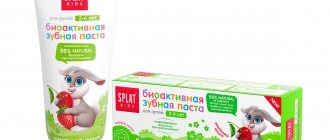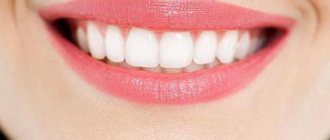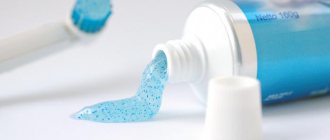From this article you will learn:
- causes of hypersensitivity of human teeth,
- best toothpaste for sensitive teeth,
- analysis of paste compositions, rating 2022.
Toothpaste can act not only as a means for cleaning teeth, but also, thanks to the inclusion of a number of active ingredients, help reduce tooth hypersensitivity, relieve inflammation in the gums, and also help strengthen tooth enamel. With increased tooth sensitivity, pain usually occurs in response to thermal and mechanical stimuli - cold, hot, when touching the teeth with a toothbrush, and sometimes even from sweets.
In most cases, this problem can be solved at home, using special toothpastes for sensitive teeth, as well as by applying gels containing one of the fluoride compounds to the necks of teeth. Pastes and gels from different manufacturers, due to their different compositions, differ in their effectiveness, and in this article we will analyze the composition of the most popular products for relieving hypersensitivity of tooth enamel.
Causes of hypersensitivity development –
First of all, this problem is associated with the thinning of the enamel layer in the area of the necks of the teeth, or with the exposure of the roots of the teeth and the thinning of the “cement” layer located on their surface.
As a result, a deeper layer of tooth tissue is exposed - dentin, which is located immediately under the enamel and cement. Dentin microscopically consists of dentinal tubes in which fluid circulates. If the dentin is not covered with enamel and cement on top, then thermal and other irritants can sharply increase the speed of fluid flow through the dentinal tubules, which ultimately leads to irritation of the nerve endings in the dental pulp and the occurrence of pain. The trigger for the development of pain (in the presence of dentin exposure) can be the consumption of acidic foods and drinks, the use of whitening toothpastes, etc.
The best toothpastes for hypersensitive teeth
Our rating includes the best toothpastes from manufacturers from Russia, Italy, and Germany. In most cases, they are united by low abrasiveness.
Biorepair Sensitive Teeth Plus
Rating: 4.9
Italian toothpaste Biorepair Sensitive Teeth Plus is designed to reduce enamel sensitivity and restore dentin structure. It contains the maximum amount of unique microRepair particles, an analogue of hydroxyapatite, which makes up enamel and dentin. Needle-like particles effectively fill cracks, making the enamel smooth and intact.
This paste has a very low level of abrasiveness (RDA 14.7), so it carefully cleans the enamel. Due to zinc ions, it has a long-lasting antibacterial effect. Sensitive Teeth Plus relieves acute pain from dental hypersensitivity. To do this, just apply a small amount of it to the problem area.
Most users note that the product effectively and quickly reduces hyperesthesia. They like that the product composition is free of fluoride, parabens, and SLS. But due to its low abrasiveness, it does not clean teeth as well as we would like, so it is useful to periodically alternate it with other toothpastes.
Advantages
- unique microRepair particles in the composition;
- low level of abrasiveness;
- does not contain fluorine, parabens, SLS;
- suitable for applications for acute pain;
- reduces tooth sensitivity;
- restores the dentin structure.
Flaws
- Doesn't clean teeth as thoroughly as I would like.
MEXIDOL dent Sensitive
Rating: 4.8
The Russian manufacturer Pharmasoft produces a paste for sensitive teeth MEXIDOL dent Sensitive. Potassium nitrate in its composition effectively reduces the pain in the nerve endings of teeth that have exposed necks or problems with the enamel. Thanks to the xylitol content, this paste restores the acid-base balance in the oral cavity and prevents the development of caries.
Many are impressed by the fact that the composition does not contain fluoride or antiseptics, so this product can be used for a long time. On the other hand, some are upset that the paste contains 2 parabens. At the same time, the big advantage of this product for hyperesthesia is its reduced abrasiveness. Oral hygiene takes place with maximum comfort.
MEXIDOL dent Sensitive not only reduces the sensitivity of teeth and gums, but also reduces bleeding of the latter. The paste has a gel-like texture and a light mint aroma. It foams just right. It gently removes plaque from teeth and has anti-inflammatory and disinfectant properties.
Advantages
- contains potassium nitrate;
- low abrasive;
- takes care of both enamel and gums;
- forms a moderate amount of foam;
- Mint predominates in taste and aroma.
Flaws
- contains parabens.
Lacalut Extra Sensitive
Rating: 4.7
We included the German Lacalut Extra Sensitive toothpaste in the rating because it contains potassium chloride and strontium acetate. These components effectively block open dental tubules. Since the nerve impulse does not pass, hyperesthesia decreases. Thanks to special rounded cleaning particles, the enamel is not damaged, which allows you to carefully care for sensitive teeth.
Please note that since the composition contains strontium acetate, this paste is not intended for children under 14 years of age. The product contains fluoride ions - 1476 ppm, therefore it is also intended to combat caries. This paste also contains sulfates, which is immediately noticeable by increased foaming.
From Avokado’s review on the irecommend site: “Lacalut Extra Sensitive paste really works and helps after the first use. The product has a rather strange, soda taste. The mint aroma does not refresh for long. Although the primary task of this paste is to eliminate hypersensitivity, it also cleanses the enamel well of plaque.”
Advantages
- reduces hyperesthesia after the first use;
- delicately but thoroughly cleanses enamel from plaque;
- it is consumed quite economically;
- has a pleasant mint aroma.
Flaws
- specific taste of pasta.
Blanx Denti Sensible Sensitive Teeth
Rating: 4.7
Italian toothpaste Blanx Denti Sensible Sensitive Teeth contains potassium chloride and hydroxyapatite, which reduce pain, protect and strengthen damaged enamel of sensitive teeth. This product is also enriched with Icelandic cetraria extract, which has very low abrasiveness and excellent cleansing effect. Arctic moss extract returns white color to teeth.
This toothpaste attracts the attention of consumers not only with its valuable components, but also with its interesting presentation. The product is not produced in a classic tube, but in a bottle with a button at the top. When you press on it, a portion of the product appears. The paste tastes like mint and salt.
Denti Sensible Sensitive paste is low-abrasive, does not scratch or thin tooth enamel. It not only effectively eliminates the problem of hypersensitivity, but also safely removes stains on tooth enamel. The paste is used very economically and foams moderately.
Advantages
- eliminates increased sensitivity of teeth;
- gently whitens;
- interesting presentation;
- its consumption is small;
- the aroma and taste are pleasant.
Flaws
- not detected.
Colgate Sensitive Pro-Relief
Rating: 4.6
We rated Colgate Sensitive Pro-Relief Toothpaste because it contains arginine (an amino acid normally found in saliva) and an insoluble form of calcium in the form of calcium carbonate. This is an innovative Pro-Argin technology that helps attract calcium to the dentin surface to form a mineral layer. The pain goes away due to blockage of open dentinal tubules.
In addition to regenerating the problem area of enamel, this paste also strengthens the gums, problems with which often lead to increased tooth sensitivity. This product is suitable for local use. You can gently rub it with your finger into a particularly problematic, painful area for a minute.
Users speak well of Sensitive Pro-Relief paste, but note that it does not work instantly for everyone. But if you use it for at least a week, a protective layer actually appears on the teeth and the recurrence of hypersensitivity is prevented. Many people like that the paste does not foam too much, but its menthol taste slightly burns the mucous membranes in the mouth.
Advantages
- Pro-Argin technology;
- takes care of both enamel and gums;
- suitable for local rubbing;
- moderate foaming.
Flaws
- Too menthol taste.
PresiDENT Sensitive
Rating: 4.5
Italian and Russian specialists of the PresiDENT brand have developed an effective Sensitive toothpaste with RDA 25. The last indicator is the level of abrasiveness. It is quite low in this product. The product contains the following useful components: potassium nitrate (reduces the sensitivity of enamel and dentin), hydroxyapatite (remineralizes enamel), fluoride (strengthens enamel and protects against caries), as well as extracts of medicinal plants that are beneficial for gums.
First of all, this paste is chosen by people with hypersensitive teeth, but it is also recommended for those who use electric toothbrushes, have undergone a whitening course, or have cervical caries. The product foams slightly and has a minty aroma. Due to its fairly dense consistency, it does not run away from the brush.
on the site irecommend o.
Advantages
- low abrasiveness;
- effective combined composition;
- moderate foaming;
- pleasant mint taste;
- Excellent for relieving tooth sensitivity.
Flaws
- the refreshing effect does not last long.
Sensodyne With fluoride
Rating: 4.5
Sensodyne Toothpaste With Fluoride was ranked as the best because it takes good care of sensitive teeth and gums. The product contains 5% potassium nitrate, which protects the nerve inside the tooth from the aggressive influence of irritants, as well as sodium fluoride 0.315%, which strengthens the enamel. This paste has low abrasiveness.
Consumers have no complaints about the paste itself. But many people don’t like that the neck of the tube is too wide and a lot of excess product is squeezed out through it even with light pressure. The taste of this paste is very pleasant. It freshens the breath well, although not for long. Its foaming is quite strong.
Many people like that increased tooth sensitivity disappears after just a few uses. Also, with the systematic use of this paste, teeth remain clean much longer, and much less plaque accumulates on them. The only caveat is that since the paste contains a high fluoride content, the oral cavity after cleaning should be rinsed as thoroughly as possible.
Advantages
- contains potassium nitrate;
- low abrasiveness;
- relieves pain and bleeding;
- protects against the proliferation of carious bacteria;
- gently cleanses and freshens breath.
Flaws
- uncomfortable neck of the tube.
ROCS Sensitive Repair & Whitening
Rating: 4.5
Sensitive Repair & Whitening toothpaste from the Russian brand ROCS quickly eliminates increased sensitivity of teeth, brightens teeth by 1.5 shades in 2 weeks of use. This product has RDA 40 - a fairly low abrasiveness rating. The smallest defects in enamel and exposed dentin tubules are sealed with calcium hydroxyapatite.
Calcium glycerophosphate and magnesium chloride (active minerals) are responsible for strengthening enamel and dentin, and also restore whiteness to teeth. Xylitol in high concentrations protects against bacteria that cause caries, and also normalizes the microflora of the oral cavity. The product does not contain fluorides, peroxides and parabens.
Users share that this toothpaste from ROCS is actually good for teeth with hypersensitivity. Some are surprised by the manufacturer's recommendation that after using this product you should not rinse your mouth, but simply spit out the remaining product. This will increase its effectiveness. This method really works. But with bleaching things are worse. It cannot cope with old plaque.
Advantages
- well thought out composition;
- does not contain fluorides and parabens;
- low abrasiveness;
- quickly eliminates increased sensitivity of teeth;
- effectively protects against caries.
Flaws
- does not cope well with old plaque.
Natura Siberica Natura Kamchatka for sensitive teeth
Rating: 4.4
The Russian organic cosmetics brand Natura Siberica also produces a toothpaste for sensitive teeth. The sea minerals included in its composition strengthen and restore the surface of tooth enamel, reducing its sensitivity. Pink pearl extract also contributes to this. Other valuable components of the paste: organic Kamchatka algae, Kuril magnolia, white clay.
Thanks to its safe composition, the paste delicately whitens tooth enamel without damaging it. And thanks to the patented Physcool molecule, extracted from peppermint leaves, it provides a long-lasting feeling of freshness. This paste does not foam much, but it is quite enough for high-quality oral hygiene.
Users with sensitive teeth leave mostly positive reviews about this paste. They note that with regular use of this remedy, tooth pain in response to cold, hot and sweet foods really disappears. The paste has a pleasant taste and does not burn the mucous membranes. But some lack quality plaque removal.
Advantages
- most components are of organic origin;
- does not cause discomfort to the mucous membrane;
- perfectly restores tooth enamel;
- foams just right.
Flaws
- It does not remove plaque very well.
Biomed Sensitive
Rating: 4.4
Biomed Sensitive toothpaste closes our rating of the best. It contains the following valuable components: calcium hydroxyapatite and L-Arginin (strengthen and restore tooth enamel, reducing tooth sensitivity), plantain extract in combination with polyphenols of birch leaves and red grape seeds (strengthen gums, have an anti-caries effect).
This restorative toothpaste is designed for daily use. It delicately cleanses and strengthens enamel, provides fresh breath and healthy gums. The product consists of 99% natural ingredients. The paste does not contain: parabens, chlorhexidine, fluorides, triclosan, SLS/SLES and other controversial components. Suitable for children from 6 years old.
Many people really like the pleasant and unusual taste of this paste with notes of grapes. People with sensitive teeth are satisfied after using this product. They feel relief after the first use. And after a week, they completely forget about the pain when eating cold, hot or sweet food. But at the same time, they complain that such a paste does not cope with plaque very well.
Advantages
- predominantly natural components of the composition;
- reduces enamel sensitivity well;
- pleasant to the taste;
- Can be used by children from 6 years of age.
How to choose a toothpaste for sensitive teeth -
Toothpastes for relieving tooth sensitivity (hypersthesia) have specific characteristics. Firstly, toothpaste for sensitive teeth usually has a fairly low abrasiveness within the RDA range of 25 to 35 (RDA - abrasiveness index). For example, for ordinary therapeutic and prophylactic toothpastes the RDA index is 75, and for whitening pastes it is usually 100-120.
The second important point to pay attention to is the active components. Different manufacturers use ingredients that are different from each other, which have different mechanisms for reducing tooth sensitivity, and as a result, have different effectiveness and different speed of onset of effect. Based on the mechanism of action, the following groups of components can be distinguished...
Active components in toothpastes for sensitive teeth -
- Potassium nitrate, potassium chloride - these components block the transmission of nerve impulses.
The transmission of nerve impulses is based on the exchange of potassium ions (located inside nerve cells) with sodium ions located outside the nerve. By increasing the concentration of potassium ions around the nerve endings, we disrupt this exchange, which leads to the absence of pain in the teeth - in response to thermal and mechanical stimuli. The advantage of these components is that the effect of their use develops very quickly. However, the result will last as long as you use them. Thus, potassium nitrate and chloride can quickly relieve pain, but they do not eliminate the very cause of hyperesthesia.
- Fluorides, strontium chloride, zinc citrate, hydroxyapatite - these components affect precisely the cause of the development of dental hypersensitivity - the accelerated movement of fluid in the dentinal tubules, which leads to irritation of the nerve endings.
Fluoride compounds (sodium fluoride, aminofluoride, monofluorophosphate), strontium chloride, zinc citrate, hydroxyapatite - all of them clog the dentinal tubules, preventing the movement of fluid in them. In addition, strontium chloride also promotes the deposition of replacement dentin and the compaction of its structure, which also helps reduce hypersensitivity. However, the downside of all these components is that the effect from their use develops more slowly than from the use of potassium nitrate or potassium chloride.
- Arginine and calcium carbonate combination - a combination of Arginine (an amino acid) and calcium carbonate in toothpaste - is also very effective in treating dental hypersensitivity.
Arginine facilitates the deposition of a layer of calcium carbonate on the surface of the teeth, which in turn stimulates the deposition of phosphates on the surface of exposed dentin and in the dentinal tubules, contributing to their clogging and reducing the movement of fluid in them. However, although it reduces sensitivity well, it does not solve the problem of demineralization of enamel and dentin. It should be noted here that the layer of calcium carbonate with arginine will be inactive, and calcium from this layer will not penetrate into the hard tissues of the teeth. This distinguishes arginine carbonate pastes from pastes with fluorides, after the use of which an active layer of calcium fluoride (CaF2) is created on the tooth surface. In addition to the fact that CaF2 also clogs the dentinal tubules on the surface of exposed dentin, calcium and fluoride from this layer are able to penetrate into the hard tissues of the teeth, strengthening them.
Conclusions -
Precisely because some components are capable of providing an immediate effect, while others (although their effect develops slowly, they eliminate precisely the cause of pain) - most toothpastes for sensitivity are made with a combined composition. Where potassium nitrate quickly relieves pain, and fluorides, hydroxyapatite, strontium chloride, or a combination of arginine and calcium carbonate clog exposed dentinal tubules.
However, there are also effective monocomponent products for use at home. Such products contain a very high concentration, usually of only one component, for example, potassium nitrate or sodium fluoride. In this way, they resemble professional means for reducing sensitivity that dentists use in their work. Examples of such gels are PRESIDENT Sensitive Plus and Colgate® Duraphat. How they can help you - read below.
Sensitive teeth: how to choose a toothpaste?
Dental problems can cause discomfort for anyone. There is hardly a person who was not afraid of the dentist as a child. One of the unpleasant manifestations may be increased sensitivity.
What is hypersensitivity
Any person can experience increased sensitivity of enamel for a short time. It’s worse when this condition takes a permanent form and prevents you from enjoying delicious dishes, drinks, or leads to a fear of opening your mouth on a frosty walk, since cold air touching your teeth leads to pain.
More precisely, sensitivity increases due to thinning of the enamel. Then it is easier for any external influences to reach the nerve inside the tooth through thin tubes that penetrate the hard tissue. Normally, a sufficient layer of enamel covers the dentin and reliably protects the nerve endings from any external irritants.
Symptoms
Unpleasant sensations and pain are caused by something that was not paid any attention to before:
- Cold drinks
- Hot tea
- Candies
- Teeth cleaning
- Any acidic drinks (juices, soda)
- Touching teeth
Sometimes these symptoms can occur with caries, periodontal disease, and enamel defects after chipping. But it also happens that the teeth seem to be absolutely healthy, but there is a problem.
The cause of increased sensitivity can be completely different actions
Causes
The cause of increased sensitivity can be completely different actions, but they are united by one excessive effect of acid on the enamel:
- Frequent use of mouthwash. They often contain acids.
- Recent bleaching. If the dentist did it, then it was done carefully and they gave you clear recommendations on what is possible and what is not. Worse. if you carried out whitening procedures at home yourself, you used strong products and could damage the enamel surface.
- There are problems with the gums from smoking, lack of professional hygiene, the formation of tartar and, as a result, exposure of the roots.
- You damage your enamel by gnawing on seeds, nuts, or other hard foods or objects.
- Rejection of stomach contents into the mouth. The so-called esophageal reflux disease, when the sphincter of the entrance to the esophagus closes weakly for some reason and when bending forward, physical activity, or in the evening before bed, acidic contents from the stomach are refluxed.
- Frequent consumption of acidic drinks during the day.
It can also be a symptom of other problems in the body.
What to do
If you know what could have caused the increase in sensitivity, rule out the effect of this factor. Also avoid anything that can negatively affect the enamel. Put off whitening, use toothpastes with a minimal abrasive effect, and a toothbrush with soft bristles.
A large number of toothpastes have been developed for sensitive teeth that can help cope with this problem.
- Hilfen Toothpaste Sensitive formula
- Colgate Sensitive Pro-Relief
- PresiDent Sensitive
- Lacalut Extra Sensitive
- Elmex Sensitive plus
- Asepta Sensitive
- Lacalut Sensitive
- Hilfen Toothpaste Sensitive formula
- Splat Professional Sensitive
Price categories and manufacturers can vary greatly. But there are several general important points that help achieve the desired effect of reducing sensitivity.
- Features of toothpaste for sensitive teeth:
- They have a low RDA. He talks about particle size. For the most gentle pastes, it can be less than 15. The lower the number, the smaller the particles contained in the paste and the more gentle they are on the enamel.
- Almost all contain calcium hydroxyapatite. It helps in remineralizing the enamel and restoring the barrier against external irritants.
- Fluorine can be contained in high concentrations or absent altogether. There is no consensus on the benefits or harms of fluoride. The peculiarity of many regions of Russia is that they are endemic areas for fluoride deficiency and the risk of developing fluorosis, which everyone is afraid of, is practically absent.
- Medicinal soothing herbs, extracts. They have a greater effect on the condition of the gums than on the enamel itself. It will be important for periodontal disease and bleeding gums.
If sensitivity continues to bother you, you should contact your dentist. The doctor may recommend specialized highly concentrated remineralizing gels for a course of treatment:
- ROCS Medical Minerals Remineralizing gel
- ROCS Medical Minerals Remineralizing gel for children Strawberry
Also, in a dental office, it is possible to apply protective coatings to the surface of teeth to reduce sensitivity.
Toothbrushes for sensitive teeth –
In cases where the touch of the toothbrush bristles to the necks of the teeth causes pain and discomfort, it is recommended to use special toothbrushes with soft bristles when brushing your teeth. These brushes are marked “Soft”. They also differ from ordinary toothbrushes in that each bristle has a rounded or very thin atraumatic tip.
Price for toothbrushes for sensitive teeth –
- SENSODYNE Sensitive toothbrush – from 160 rubles,
- LACALUT Sensitive toothbrush – from 190 rubles.
Important: use this brush only in cases where pain occurs when touching your teeth with a regular toothbrush. They cannot be used on an ongoing basis, because... Brushes with soft bristles remove microbial plaque from teeth much worse than brushes with medium hardness, and therefore, with prolonged use, plaque and tartar may accumulate on the teeth.
